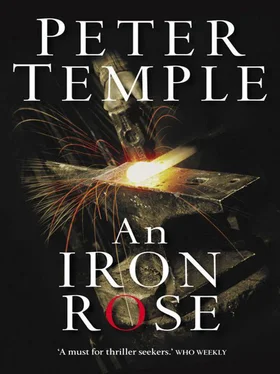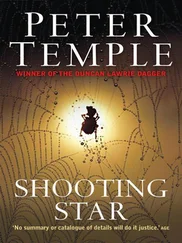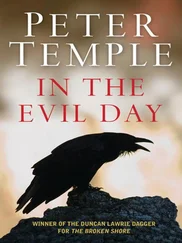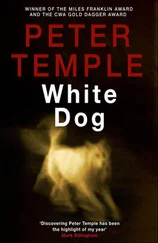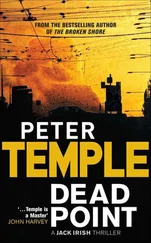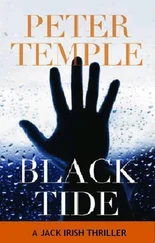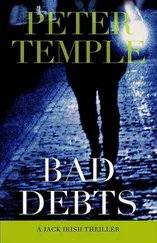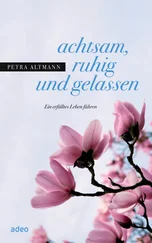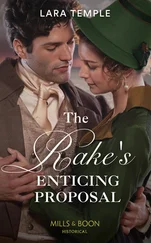Peter Temple - An Iron Rose
Здесь есть возможность читать онлайн «Peter Temple - An Iron Rose» весь текст электронной книги совершенно бесплатно (целиком полную версию без сокращений). В некоторых случаях можно слушать аудио, скачать через торрент в формате fb2 и присутствует краткое содержание. Жанр: Триллер, на английском языке. Описание произведения, (предисловие) а так же отзывы посетителей доступны на портале библиотеки ЛибКат.
- Название:An Iron Rose
- Автор:
- Жанр:
- Год:неизвестен
- ISBN:нет данных
- Рейтинг книги:3 / 5. Голосов: 1
-
Избранное:Добавить в избранное
- Отзывы:
-
Ваша оценка:
- 60
- 1
- 2
- 3
- 4
- 5
An Iron Rose: краткое содержание, описание и аннотация
Предлагаем к чтению аннотацию, описание, краткое содержание или предисловие (зависит от того, что написал сам автор книги «An Iron Rose»). Если вы не нашли необходимую информацию о книге — напишите в комментариях, мы постараемся отыскать её.
An Iron Rose — читать онлайн бесплатно полную книгу (весь текст) целиком
Ниже представлен текст книги, разбитый по страницам. Система сохранения места последней прочитанной страницы, позволяет с удобством читать онлайн бесплатно книгу «An Iron Rose», без необходимости каждый раз заново искать на чём Вы остановились. Поставьте закладку, и сможете в любой момент перейти на страницу, на которой закончили чтение.
Интервал:
Закладка:
Further out, on bigger blocks, windswept, treeless, beyond mowing, stand exhausted weatherboards, at the end of their histories, all hope gone, boards sprung, stumps rotten, roofs rusted.
Melanie Pavitt’s weatherboard house stood in a sea of long yellow grass, leaning with the prevailing wind, bright junk mail blowing around. The brick chimney on the right was bulging at the bottom and swaying inwards at the top. The windows’ sashcords had disintegrated and pieces of weatherboard fallen off the side of the house held up the top panes. I felt the verandah boards, grey, eroded like Ethiopian hillsides, sag under my weight. Next door was a work in progress, a long brick-veneer train carriage of a house with two window openings blocked with plywood and the end wall half-built. Silver insulation foil caught the light. Behind the house was a huge shed, more factory than garage. A newish red Nissan, dusty, stood at the end of a paved section of driveway facing the shed across a riverbed of bluestone dust.
There was no response to my knocks. Inside a radio was on at full volume. Country and western. I thought of going around the back, then a vertical blind in the unfinished house moved. I went over and knocked on the unpainted front door. It opened instantly, on a chain. A woman in her forties, pretty face, plump, long dyed auburn hair, sleep in her eyes, lipstick a little smudged, said, ‘Yes.’
‘Sorry to bother you,’ I said. ‘I’m looking for Melanie Pavitt. Does she still live next door?’
There was a wary silence. Finally, she said, ‘Police?’
‘No. I’m not selling and I’m not collecting either. It’s a personal matter.’
She put a finger to the corner of her right eye, pulled the skin back. ‘Yeah, she’s next door.’
‘She doesn’t seem to be home. Any idea when she might be back?’
The woman closed the door briefly to take off the chain. She was wearing a purple dressing gown. ‘Didn’t hear her go,’ she said. ‘The car makes a helluva noise, exhaust shot. She might be in the back. Let me put something on, I’ll come with you.’
I waited on the verandah. It was quiet here, just a faraway hum of traffic. The woman came out wearing tight jeans, a fluffy blue mohair-like top with three-quarter sleeves and black pumps. She had repaired her make-up. She walked ahead of me, buttocks jiggling.
‘Doesn’t go out much, Mel,’ she said. ‘Not since the boyfriend moved in. Nice bloke. Used to be in and out of my place. Not anymore.’
We tried knocking again. Nothing. Just the music.
‘Try the back,’ said the woman. ‘By the way, my name’s Lee-Anne, two words with a hyphen.’
‘John,’ I said. We walked down the car tracks beside the house. The kitchen was a lean-to at the back, younger than the main house.
Lee-Anne knocked on the back door. The music was louder here. ‘Stand by Your Man’.
‘Won’t hear anything over that racket,’ Lee-Anne said. She tried the doorknob. The door opened. She took a step inside.
‘Mel? You there? Someone for you.’
Nothing. Just the music.
Lee-Anne took another step in. I followed. The kitchen was neat, a smell in the air of something burnt. ‘Mel!’ Lee-Anne shouted. ‘Barry!’
The door to the rest of the house was closed. Lee-Anne opened it and called out again.
We went down a short, dark passage, past a door on the left, towards a closed door and the music. At the door, Lee-Anne paused, turned to me. ‘You go first,’ she said. She bit her lower lip.
I opened the door.
It was a sitting room, also dark, curtains drawn, old blond-wood furniture, a big television, radio on top of it. A fairground barker’s voice was saying, ‘Wangaratta Ford. Where the best deals are waiting for you.’ The burnt smell was gone now. Replaced by something else.
I knew what it was. Before I saw the man.
Lee-Anne came in behind me and screamed.
He was sitting in the chair facing the television. A big part of his face was missing, a black, congealing cavity, and his whole chest was dark with dried blood. Behind his head what looked like a gallon of blood had seeped into the chair upholstery.
That was the other smell: the salty, sickening slaughterhouse smell of blood.
I stepped forward for a closer look at the man. He was holding a revolver in his right hand.
‘Barry?’ I said.
Lee-Anne nodded, face chalk-white, lipstick startling against it.
‘Don’t touch anything,’ I said.
Two other doors, closed, led from the room. I opened the left-hand one: a small bedroom, empty.
I turned. Lee-Anne was looking at the floor. ‘Through there?’ I said, pointing.
‘Mel’s bedroom,’ she said softly, without looking up.
I opened the door. Double bed, made. Wardrobe, dresser. No-one there.
I went back, down the dark passage, to the other door.
‘Bathroom,’ said Lee-Anne from close behind me.
I opened the door.
The bath was directly in front of me. A woman was in it, naked, floating in dark water. Shot once, through the left eye. She had been sitting upright and the bullet had sprayed the contents of her head over the wall behind and beside her.
‘Don’t look,’ I said. ‘Call the cops from your place.’
I heard her run down the passage. Then I had a look around. An old suitcase was on top of the wardrobe in Melanie’s bedroom. I took it down, gripping the handle in a tissue from the dressing table, and opened it on the bed: perhaps a dozen letters, an empty perfume bottle, a pair of gold high heels, a gold chain belt, three packets of photographs, a bead purse with some Fijian coins, a small velvet box that had held a ring, a black-covered book.
I opened the book. On the first page was written large: My Life. By Melanie Loreen Pavitt .
I put the letters, the photographs and the book into my shirt, replaced the suitcase, left the house. At the car, I made sure Lee-Anne wasn’t watching and put the stolen goods under the front seat. Then I drove the car into Lee-Anne’s yard, over the bluestone dust and parked behind the house. I found the emergency cigarettes and went round the front and sat on the front step.
‘Get a smoke off you?’ she said from behind me, voice tremulous. ‘I’m shakin.’
‘Natural,’ I said, offering her the packet and the matches. She lit up and sat down beside me. We sat there smoking, not saying anything, waiting for the sirens and the police. When I heard the first wail, I said, ‘Inside’s better. There’ll be television people and other journos coming. They tip them off.’
We went in and stood at the breakfast bar in Lee-Anne’s kitchen. This room was finished, all pale gleaming wood and stainless steel.
‘Nice room,’ I said. ‘Listen, I’ll explain afterwards but I’m going to arrange it with the cops that they tell them the bodies were found by a neighbour. They’ll want you on camera. You want to do that? It’ll get rid of them.’
She nodded. The idea didn’t displease her.
‘Okay. Don’t say anything about what you saw. Don’t mention me. Just say something like, “I’ve lost a good friend and neighbour and I’d appreciate being left alone to grieve”.’
She nodded again, eyes brighter. Then the cops knocked.
I was lucky. I got an intelligent plainclothes cop straight off. He listened to me, wrote down my name and the number I gave him to ring, rang his station commander, gave him the number. The superior rang back inside five minutes, they exchanged a few words, the cop came over.
‘That’ll be in order, Mr Faraday. Mrs Vinovic’s giving a statement in the sitting room. I’ll take yours here.’
We heard the sound of a helicopter. ‘Vultures here,’ the man said. I looked out of the window. The helicopter was above Melanie’s house, camera protruding like a gun.
Читать дальшеИнтервал:
Закладка:
Похожие книги на «An Iron Rose»
Представляем Вашему вниманию похожие книги на «An Iron Rose» списком для выбора. Мы отобрали схожую по названию и смыслу литературу в надежде предоставить читателям больше вариантов отыскать новые, интересные, ещё непрочитанные произведения.
Обсуждение, отзывы о книге «An Iron Rose» и просто собственные мнения читателей. Оставьте ваши комментарии, напишите, что Вы думаете о произведении, его смысле или главных героях. Укажите что конкретно понравилось, а что нет, и почему Вы так считаете.
